summary例子和问题详解
summary公式
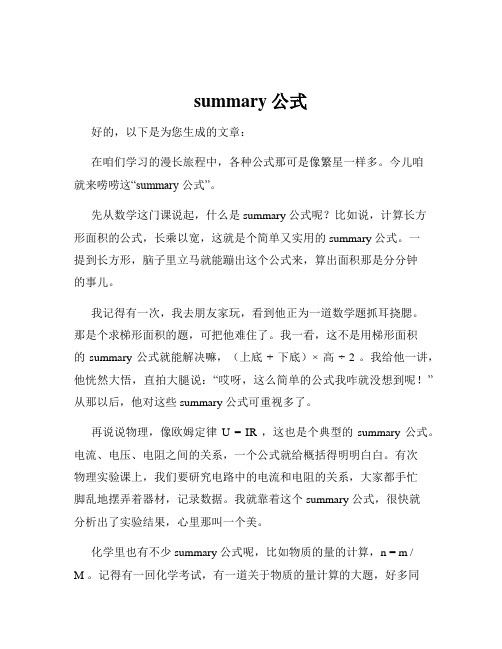
summary公式好的,以下是为您生成的文章:在咱们学习的漫长旅程中,各种公式那可是像繁星一样多。
今儿咱就来唠唠这“summary 公式”。
先从数学这门课说起,什么是 summary 公式呢?比如说,计算长方形面积的公式,长乘以宽,这就是个简单又实用的 summary 公式。
一提到长方形,脑子里立马就能蹦出这个公式来,算出面积那是分分钟的事儿。
我记得有一次,我去朋友家玩,看到他正为一道数学题抓耳挠腮。
那是个求梯形面积的题,可把他难住了。
我一看,这不是用梯形面积的 summary 公式就能解决嘛,(上底 + 下底)×高 ÷ 2 。
我给他一讲,他恍然大悟,直拍大腿说:“哎呀,这么简单的公式我咋就没想到呢!”从那以后,他对这些 summary 公式可重视多了。
再说说物理,像欧姆定律U = IR ,这也是个典型的summary 公式。
电流、电压、电阻之间的关系,一个公式就给概括得明明白白。
有次物理实验课上,我们要研究电路中的电流和电阻的关系,大家都手忙脚乱地摆弄着器材,记录数据。
我就靠着这个 summary 公式,很快就分析出了实验结果,心里那叫一个美。
化学里也有不少 summary 公式呢,比如物质的量的计算,n = m /M 。
记得有一回化学考试,有一道关于物质的量计算的大题,好多同学都栽了跟头,可我因为把这个公式记得牢牢的,轻松就解出了答案,成绩出来的时候,可把我给高兴坏了。
语文也有类似的“summary 公式”哦。
比如写作文,总分总的结构就是一种“summary 公式”。
开头点明主题,中间详细论述,结尾总结升华。
有一次写,我按照这个结构来,开头就说“我的梦想是成为一名科学家”,中间讲了为啥有这个梦想,以及为实现梦想做的努力,结尾再来一句“我相信,只要坚持不懈,我的梦想一定能实现”。
老师给了高分,还在全班面前表扬了我。
英语里的语法规则也可以看成是 summary 公式。
像一般现在时的构成,主语 + 动词原形(第三人称单数加 s / es )。
专八写作SUMMARY指南

连接句子和段落
在撰写Summary时,可以使用过渡词来连接句子和段落,使文 章更加流畅。
表明逻辑关系
过渡词还可以表明句子或段落之间的逻辑关系,如因果、转折、 并列等。
使语言更加自然流畅
使用过渡词可以使语言更加自然流畅,增强文章的可读性。
04
Summary常见错误及纠 正方法
理解偏差
总结者未能准确理解原文的主旨和重 要信息,导致总结内容偏离原文。
使用关键词汇和短语
为了使Summary更加精炼,可以使用关键词汇和短语来表达意思。
保持客观
避免个人观点和情感色彩
在撰写Summary时,应保持客观中立的态 度,避免个人观点和情感色彩的干扰。
引用数据和事实
为了使Summary更加客观,可以引用数据 和事实来支持观点。
避免主观评价和判断
在Summary中,应避免对原文进行主观评 价和判断。
02
概括文章大意
在理解文章的基础上,用简练的 语言概括文章的大意,明确文章 的中心思想。
03
确定Summary的立 场
确保在撰写Summary时,立场 与原文保持一致,不要加入个人 观点或对原文进行评论。
筛选关键信息
识别重要内容
从原文中筛选出重要的信息,包括主要论点、论据、 事实和数据等。
排除次要细节
在筛选关键信息时,应排除与主题无关或次要的细节, 只保留与主题紧密相关的信息。
保持信息的完整性
确保筛选出的关键信息能够全面反映原文的主旨和观 点,不要遗漏重要内容。
整合信息并撰写Summary
组织信息
将筛选出的关键信息进行有序的组织和排列,确保逻辑清晰、条理 分明。
撰写Summary
用简洁、连贯的语言将组织好的信息撰写成Summary,注意保持 原文的逻辑和结构。
Summary 优质课件

冰雪卫士
Nila B. Smith
Summary
Summary:
1. 人们常说骄兵必败。拿破仑和希特勒在俄罗斯的失 败就是典型的例子。
2. 1812年,拿破仑率领大军入侵俄罗斯。他自信会 马到成功,预言5周内攻下俄国。
3. 然而他未能料到会在莫斯科遭遇劲敌---俄罗斯的严 冬,从而以失败告终。
But he was not prepared for the devastating enemy that met him in Moscow --- the severity of Russian winter. Thus he ended in failure.
Summary:
4. 1941年,希特勒不宣而战,对苏联发动 袭击。他希望速战速决,预计3个月结束 战役。
4. 1941年,希特勒不宣而战,对苏联发动袭击。他 希望速战速决,预计3个月结束战役。
5. 但是,他犯下了同样的致命错误---低估了俄罗斯冬 季的严酷,而付出了惨重的代价。
6. 任何军事行动都必须考虑到自然因素。对俄罗斯人 民而言,严冬是他们的冰雪卫士。
Summary:
1. 人们常说骄兵必败。拿破仑和希特勒在 俄罗斯的失败就是典型的例子。
In 1812, Napoleon led his Grand Army into Russia. Confident of a quick victory, he predicted the conquest of Russia in five weeks.
Summary:
3. 然而他未能料到会在莫斯科遭遇劲敌 --俄罗斯的严冬,从而以失败告终。
In 1941, without a declaration of war, Hitler began an invasion of the Soviet Union. He expected a short campaign --- to last no longer than 3 months.
【上海高考概要写作】summary writing1(有解析)

Exercise 1With only two weeks to go before Christmas, buying presents is a high priority for a lot of people. However, this year not so many people are leaving their homes to go shopping. These days lots of people can do their shopping in the comfort of their own home with the help of the Internet.Online shopping is becoming more and more popular for a number of reasons: prices are often lower online; you don’t have to queue up in busy shops and you can buy almost any product imaginable with just a few clicks of your mouse.Both male and female are buying into the trend, but women are expected to do more shopping on the Internet than men. It seems women are now more attracted to the convenience of online shopping than they used to be. Average spending online this Christmas by women will rise to £ 240 (3.360 yuan) compared to the slightly lower average of £ 233 (3,262 yuan) for men.In the past a lot of people were reluctant to shop online. Many were worried about the security of entering their card details on the Internet and the reliability of the Internet but as shopping online has become more widespread, these worries have begun to disappear. 45% of Internet users still do have security worries but it hasn’t slowed down the ever-increasing numbers of online shoppers.One victim of the online shopping boom is the UK high street. The average spending per person on the high street is only £197. 70% of Internet users who are now buying their Christmas gifts online.参考范文:This year, people are doing Christmas shopping online at home rather than leave their homes for cheaper goods and more convenience.(要点1) With increasing popularity of online shopping, women spend more than men.(要点2) Although safety is a major concern for shopping online,still more and more people choose to shop online.(要点3) With the pressure from widespread online shopping, traditional shops in the UK high street began their sales promotion earlier this Christmas.(要点4)分析过程:一、试题详解1.核心内容本文是一篇说明文,共分五段。
summary五种语篇类型

summary五种语篇类型一、新闻报道型语篇:赛季收官战,张三夺得冠军在本赛季的最后一场比赛中,张三以出色的发挥夺得了冠军。
在比赛中,张三展现出了出色的技术和精湛的战术,赢得了观众们的喝彩。
这场比赛是张三职业生涯的重要里程碑,也是他为之努力奋斗的结果。
张三表示,这次的胜利是他多年来不懈努力的回报,他将继续保持好的状态,为自己的职业生涯继续努力。
二、说明性语篇:如何正确佩戴口罩在当前的疫情形势下,正确佩戴口罩是非常重要的。
首先,要选择合适的口罩尺寸,确保口罩能够完全覆盖口鼻部位。
其次,佩戴口罩前要先洗手,避免带入细菌。
然后,将口罩的金属条置于鼻梁上,用手指按压至合适位置,确保口罩紧贴面部。
最后,佩戴口罩期间要避免触摸口罩,以防止交叉感染。
正确佩戴口罩可以有效防护病毒的传播,保护自己和他人的健康安全。
三、议论性语篇:电子书是否取代传统纸质书?随着科技的发展,电子书在市场上越来越普及。
有人认为电子书将会取代传统纸质书,但也有人持不同意见。
支持电子书的人认为,电子书具有便携性和可存储性,可以一次携带大量图书。
而反对者认为,纸质书有独特的香气和触感,更能给人带来阅读的愉悦感。
另外,电子书存在电量不足、眼睛疲劳等问题,也限制了其发展。
综合来看,电子书和纸质书各有优缺点,未来二者可能会共存。
四、故事型语篇:小明的励志故事小明是一个普通的学生,但他有一个不平凡的梦想——成为一名医生。
面对学习的困难和挑战,小明从不退缩,他努力学习,积极参加各种活动,提高自己的能力。
最终,他成功考上了理想的医学院,并成为一名优秀的医生。
小明的故事告诉我们,只要有梦想,勇往直前,就一定能够实现自己的目标。
五、说明性语篇:如何养成良好的阅读习惯养成良好的阅读习惯对于个人的成长与发展非常重要。
首先,要制定阅读计划,每天安排一定时间进行阅读。
其次,选择适合自己的阅读材料,根据自己的兴趣和需求选择不同的书籍。
然后,要有专注的阅读环境,远离干扰和噪音,集中注意力进行阅读。
2020年上海高考概要写作summary writing2(10篇,有解析)

Exercise 1Water is very important for living things. Without water there can be no life on the earth. All animals and plants need water. Man also needs water. Almost everyone knows that water covers three- fourths of the earth5s surface. Most of it, however, is in the oceans and is too salty to drink. Also, some of it is frozen and cannot be used. In fact, less than one percent is left for the use of people, animals and plant life.All through history men have tried to build their homes near the sources of fresh water. Now fresh water is becoming scarce, but more and more is needed because of the increasing number of people in the world. Some industries also use large amounts of fresh water in the production of things such as steel, petrol, paper, rubber and so on.Meanwhile, water problem is becoming more serious and more complex. Our increasing population tremendously increases urban wastes, primarily polluted water. On the other hand, increasing demands for water will decrease substantially the amount of water available for diluting(稀释)wastes. Rapidly expanding industries which involve more and more complex chemical processes will produce larger volume of liquid wastes, and many of these will contain chemicals which are poisonous. To feed our rapidly expanding population, agriculture will have to be intensified. This will involve ever-increasing quantities of agricultural chemicals.Scientists estimate that the problem of water shortage will become severe. Thus it is apparent that effective steps must be taken immediately to develop corrective measures for the pollution problem and to find new ways of saving and producing fresh water as well. Some nations have worked on the problem and are already sharing their information with others. They are trying to keep their rivers from becoming polluted. Deep wells are also being dug, and rain water is being collected in huge artificial lakes. In one way or another, they hope to provide enough water to satisfy the needs of their people.参考范文:Water is essential for all the living things on the earth.(要点1) With the worldwide increase of population,more water is needed.(要点2) Meanwhile,water sources are getting polluted by poisonous chemical wastes produced by human beings in one way or another.(要点3) Thus measures are being taken to solve this problem, hoping to find better ways to save and producewater to meet the needs.分析过程1.核心内容本文是一篇说明文,全文分为四段。
英语summary万能模板
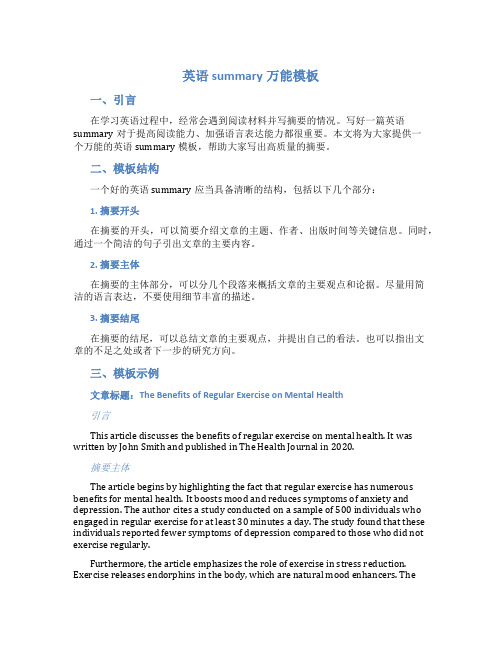
英语summary万能模板一、引言在学习英语过程中,经常会遇到阅读材料并写摘要的情况。
写好一篇英语summary对于提高阅读能力、加强语言表达能力都很重要。
本文将为大家提供一个万能的英语summary模板,帮助大家写出高质量的摘要。
二、模板结构一个好的英语summary应当具备清晰的结构,包括以下几个部分:1. 摘要开头在摘要的开头,可以简要介绍文章的主题、作者、出版时间等关键信息。
同时,通过一个简洁的句子引出文章的主要内容。
2. 摘要主体在摘要的主体部分,可以分几个段落来概括文章的主要观点和论据。
尽量用简洁的语言表达,不要使用细节丰富的描述。
3. 摘要结尾在摘要的结尾,可以总结文章的主要观点,并提出自己的看法。
也可以指出文章的不足之处或者下一步的研究方向。
三、模板示例文章标题:The Benefits of Regular Exercise on Mental Health引言This article discusses the benefits of regular exercise on mental health. It was written by John Smith and published in The Health Journal in 2020.摘要主体The article begins by highlighting the fact that regular exercise has numerous benefits for mental health. It boosts mood and reduces symptoms of anxiety and depression. The author cites a study conducted on a sample of 500 individuals who engaged in regular exercise for at least 30 minutes a day. The study found that these individuals reported fewer symptoms of depression compared to those who did not exercise regularly.Furthermore, the article emphasizes the role of exercise in stress reduction. Exercise releases endorphins in the body, which are natural mood enhancers. Therelease of endorphins during exercise helps to reduce stress and promote a sense of well-being. The author also explains that exercise can improve cognitive function and boost memory and concentration.The article also discusses the impact of exercise on sleep quality. Regular exercise helps regulate sleep patterns and can improve the quality of sleep. The author cites a study conducted on individuals with insomnia, where exercise was found to be an effective intervention in improving sleep quality.摘要结尾In conclusion, the article highlights the positive effects of regular exercise on mental health. It provides evidence that exercise can improve mood, reduce symptoms of anxiety and depression, reduce stress, improve cognitive function, and enhance sleep quality. It is recommended that individuals incorporate regular exercise into their daily routines to reap these mental health benefits.四、总结通过使用以上的万能summary模板,我们可以更加轻松地写出高质量的英语摘要。
summary函数检验异常点和强影响点

summary函数检验异常点和强影响点异常点和强影响点是数据分析中常用的概念,用于识别数据集中的特殊值和对整体结果产生较大影响的值。
在本文中,我们将探讨如何使用summary函数来检验异常点和强影响点。
让我们了解一下summary函数的基本功能。
summary函数是一种统计函数,它可以提供关于数据集中各个变量的描述性统计信息,例如最小值、最大值、中位数、均值等。
通过查看summary统计结果,我们可以初步了解数据的分布情况和异常值的存在。
那么,如何使用summary函数来检验异常点呢?首先,我们需要将数据导入到R环境中,并使用summary函数对数据进行描述性统计。
通过观察summary统计结果,我们可以查看数据的最小值和最大值。
如果数据集中存在明显偏离常规范围的数值,即超出最小值和最大值的范围,那么这些数值很可能是异常点。
举个例子来说明。
假设我们有一组身高数据,我们可以使用summary函数来检查是否存在异常值。
假设我们的数据集有100个样本,其中一个样本的身高是300cm。
我们可以使用summary函数查看数据的最小值和最大值。
如果最小值是150cm,最大值是200cm,那么300cm显然是一个异常值。
除了使用最小值和最大值来检验异常点,我们还可以使用其他统计量,例如中位数和四分位数。
通过比较这些统计量与数据集的分布情况,我们可以进一步判断是否存在异常值。
接下来,让我们看看如何使用summary函数来检验强影响点。
强影响点是指对整体结果产生较大影响的值。
在统计分析中,我们通常使用回归分析来检测强影响点。
回归分析可以用来探讨自变量与因变量之间的关系,并通过计算回归系数来衡量这种关系的强度。
在回归分析中,我们可以使用summary函数来查看回归模型的拟合优度和各个变量的回归系数。
如果某个变量的回归系数较大,那么这个变量很可能是一个强影响点。
此外,我们还可以通过观察回归模型的拟合优度来判断整体结果是否受到某个样本的强烈影响。
如何写summary范例

如何写summary范例
写摘要的方法有很多种,但以下是一个基本的步骤和示例:
步骤:
1. 阅读全文:仔细阅读要写摘要的文章、报告或文档,确保理解其内容。
2. 确定关键信息:标记或记录下文章中的关键观点、主题、事实和结论。
3. 组织信息:根据关键信息的逻辑关系,将它们组织成一个连贯的段落。
4. 撰写摘要:使用自己的语言,简洁地概括文章的主要内容,包括主要观点、重要事实和结论。
5. 保持简洁:摘要应简洁明了,突出重点,避免冗长和复杂的措辞。
6. 校对摘要:检查摘要是否准确地反映了原文的内容,是否流畅和易读。
示例:
假设我们有一篇关于全球气候变化的文章,以下是一个可能的摘要:
全球气候变化是当前面临的一个重大挑战,它对生态系统、人类社会和经济发展都带来了深远的影响。
本文主要探讨了气候变化的原因、影响以及应对措施。
气候变化是由人类活动导致的温室气体排放引起的,其主要表现为全球气温上升、海平面上升、极端天气增多等。
这些变化已经对生态系统造成了严重破坏,同时也威胁到人类的生存和发展。
为了应对气候变化,国际社会已经采取了一系列措施,如减排、提高能源效率、推广可再生能源等。
同时,个人也可以通过改变生活方式、减少能源消耗等方式为应对气候变化做出贡献。
希望这个示例能帮助你了解如何写摘要。
记得根据具体文章的内容和风格进行调整,使摘要准确、简洁地概括原文的要点。
summary模板及例子
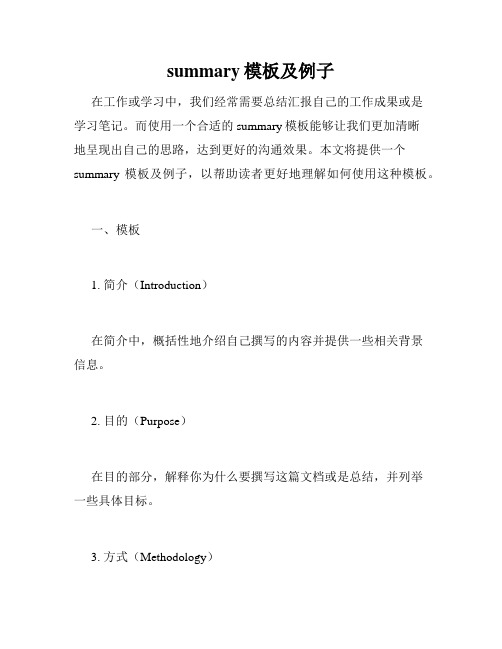
summary模板及例子在工作或学习中,我们经常需要总结汇报自己的工作成果或是学习笔记。
而使用一个合适的summary模板能够让我们更加清晰地呈现出自己的思路,达到更好的沟通效果。
本文将提供一个summary模板及例子,以帮助读者更好地理解如何使用这种模板。
一、模板1. 简介(Introduction)在简介中,概括性地介绍自己撰写的内容并提供一些相关背景信息。
2. 目的(Purpose)在目的部分,解释你为什么要撰写这篇文档或是总结,并列举一些具体目标。
3. 方式(Methodology)在此部分,说明使用的方法或是技术,以及撰写文档或是总结的步骤和流程。
4. 结论(Conclusion)这一部分用来呈现所得出的结论或是总结结果,同时可以回顾总结的过程和方法,纠正错误。
二、例子1. 简介本文总结了在过去12个月中我们公司所做的客户调研,并分析了客户反馈的结果。
调研主要围绕客户对我们公司产品、服务以及沟通方式的看法和建议,以帮助我们进一步优化我们的运营。
2. 目的本文的目的是向公司管理层及其他相关部门展示我们在客户调研中的表现,并根据客户反馈提出具体的改进措施。
此外,我们还想与其他同行分享我们总结的调研经验,并希望能够吸取其他同行的经验和建议。
3. 方式为了了解客户对我们的看法,我们先后采取了几种方法。
首先,我们开展了在线调查,以收集客户的基本信息、满意度、建议和反馈。
然后,在调研结果出来之后,我们安排了客户面对面访谈,以深入了解他们的不满和建议。
同时,我们也通过数据分析软件分析了在线调查和面对面访谈的数据,以及调研过程中的行为和反应等。
4. 结论结果表明,我们的客户普遍对我们的产品和服务都比较满意,但是在沟通方式上有所不足。
根据客户建议,我们已经开始优化我们的客户服务和沟通方式,并制定了一些具体的行动计划。
在未来的12个月中,我们将会持续跟进这些计划,并在下次的客户调研中取得更好的表现。
总之,使用一个合适的summary模板能够让我们更好地总结自己的工作和学习笔记,使得总结结果更加清晰有效。
上海高中summary练习题及讲解

上海高中summary练习题及讲解在准备上海高中的英语总结练习题时,可以设计一些练习,帮助学生提升他们的总结能力。
以下是一些练习题的例子,以及对如何解答这些题目的简要讲解。
练习题1:阅读以下段落,并总结其主要内容。
"The Great Gatsby, a novel by F. Scott Fitzgerald, is set in the 1920s and explores themes of wealth, love, and the American Dream. The story is narrated by Nick Carraway, who becomes entangled in the complex lives of his neighbors, Tom and Daisy Buchanan, and the enigmatic Jay Gatsby."答案示例:The Great Gatsby is a novel set in the 1920s that delves into the American Dream and the pursuit of wealth and love. It is narrated by Nick Carraway and centers around the lives of the Buchanans and Gatsby.讲解:在总结时,要抓住文章的核心主题和主要人物。
去掉细节,只保留关键信息。
注意不要引入原文中未提及的内容。
练习题2:请根据以下新闻报道,提炼出最重要的信息。
"The city council has approved a new plan to reduce trafficcongestion. The proposal includes the expansion of public transportation services, the introduction of bike lanes, and the implementation of a congestion charge in the central business district."答案示例:The city council has greenlit measures to alleviate traffic by enhancing public transit, adding bike lanes, and instituting a congestion charge in the CBD.讲解:在提炼新闻报道时,要关注行动主体(city council)、主要措施(public transportation services, bike lanes, congestion charge)和目标(reduce traffic congestion)。
雅思阅读Summary题型解析及应对策略

雅思阅读Summary题型解析及应对策略最近的阅读考试中,Summary题型出现的频率及数量均呈现上升态势。
但是,很多考生对于这样的题型还是束手无策,在考场上浪费大量的时间却还是不能准确给出答案。
造成这样结果的原因除去考生时间把握能力差以外,Summary 题型本身形式多样,概括性高等也是造成这样结果的重要因素。
在Summary题型当中,往往会出现两种形式的填空。
一种是直接在原文找词填空,另一种给出Wordlist,让考生根据原文内容选词填空。
这两种形式在近期的考试中都有出现。
在此,笔者将对Summary题型两种形式的特点以及解题对策作简要的概括。
一、直接在原文找词填空相对来讲这种形式的Summary比较简单一些。
Summary虽属归纳总结类的题目,但是直接在原文找词填空的这种类型却是较易定位的。
一般来说,题目中都会有较明显的提示词来帮助考生定位到原文中的相关部分。
所以,往往这种形式的Summary解题重点仍然集中在细节定位上面。
比如Cambridge 5 Test 1 Jonson’s Dictionary当中的4道题目,首先可通过‘1764’这个明显的数字来定位到段落,接下来第一道题目可用garret或long central desk做定位。
第二道用数次40000或者80定位,但是值得一提的是这里的80在原文中是以‘eighty’的形式出现的,这中情况出现的不多,一般情况下考生以数次作为定位词还是可以很快确定答案所在位置的。
接下来的两道,可以人名James Boswell和achievement作定位。
最后一道用king可以很容易在最后一段找到答案。
另外,这种类型的Summary符合顺序原则,如此一来,可以更加有效的帮助考生缩小定位的范围。
除此之外,值得考生注意的还有,这种直接在原文找词填空的Summary,其答案一般为原文原词,很少会出现需要考生自己概括答案的情况。
综上所述,可以看出此种类型的Summary相对来说还是比较容易拿分的,考生在考试过程中遇到这类的题目通常不会花费太多的时间就可以定位到答案所在的部分。
【上海高考概要写作】summary writing5(10篇,有解析)

Exercise 1A father’s relationship to his child’s current and future academic success and the level of his or her development in academic potential and scholastic achievement are both factors with some rather interesting implications that educators are beginning to study. As a matter of fact, “life with father” has been discovered to be a very important factor in determining a child’s progress or lack of progress in school.A recent survey of over 16,000 children made by the National Child Development Study in London revealed that children whose fathers came to school conferences and accompanied their children on outings did better in school than those children whose fathers were not involved in those activities. The study, which monitored children born during a week in March, 1992,from the time of their birth through the years of their early schooling, further revealed that the children of actively involved fathers scored much higher in reading and math than those children whose only involved parent was the mother. The purpose of the study was to evaluate the role played by fathers in the raising of a child. It indicated a much higher level of parental involvement by the father than had been anticipated. Over 66% of the fathers were said to have played a major role in parental responsibility.The study also suggested that the greatest level of parenting took place in the families of only child. As the number of children and financial expenses increases, the father’s apparent interest and involvement with the children decreased. However, no matter what the size or financial condition of the family,a father’s active participation in the child’s development made a definite difference in the child’s progress.The study further revealed that while the frequency of overnight absences reflected a corresponding deficiency of the child’s level in math and reading, a father’s employment on night shifts appeared to have little effect on the child’s academic progress. The information evaluating the level of the father’s parenting performance was taken primarily from the admittedly subjective observations of their wives.参考答案:A recent study discovered that a father^ influence played a significant role in the level of the child’s academic progress.(要点1) As is suggested, the father’s involvement with children was affected by the size of the family and its financial expenses.(要点2) So children who tended to progress academically were those only children.(要点3) Moreover, a father’s frequent overnight absence had a bad effect on the child’s progress.(要点4)分析过程:试题详解1.核心内容本文是一篇说明文,共四段。
雅思阅读summary详解

雅思阅读summary详解上海环球雅思今天,环球雅思为大家带来了雅思阅读SUMMARY详解,供大家参考使用。
希望对大家有所帮助。
首先,审题,注意字数要求---No more than two words,是否有段落定位---无,和该填空题的形式---原文原词填空。
其次,判断该题的出题位置。
有两种方法,其一是可以通过summary的标题判断,题目问的是what steps should schools take to reduce bullying?大家应该可以判断出该summary考察局部。
其二,可以根据题位判断,这篇文章总共有四种题型,分别为list of heading,选择(细节),summary,和选择(主旨),其中LOH和选择(主旨)不占据题位,因此summary 成了最后一种题型,出题位置应该是文章后半段。
接着,我们通过summary的首句定位,定位词为step,school authorities,可以定位到文章E 部分。
观察发现文章E部分和summary都有四段组成,因此,每段对应。
第三步,定位到段后,注意空格前后的词,判断每个空格的词性。
35和37题前均为冠词,因此空格填名词,36和38题前均为形容词,空格词性仍为名词,39题和bullying构成并列信息,因此,应该填动名词。
第四步,以空格所在句为单位,划定位词,定位到句,同时结合空格前后单词确定答案。
35所在句我们定位到了E段第一句,同时produce和develop构成同义替换,所以答案为policy。
36题所在句我们可以通过条件句去定位,定位到E段第二行。
同时空格前的词为explicit与detailed构成同义替换,所以答案为guidelines。
37题前为介词(through)十the结构,因此,介词为解题的关键点,所以定位到E段第二段的第二行,答案为curriculum。
38题我们通过trained和self-confident定位到第三段的第二行, 同时空格前的词potential与be liable to be 构成了同义替换,因此答案为victims。
【上海高考概要写作】summarywriting4(10篇,有解析)
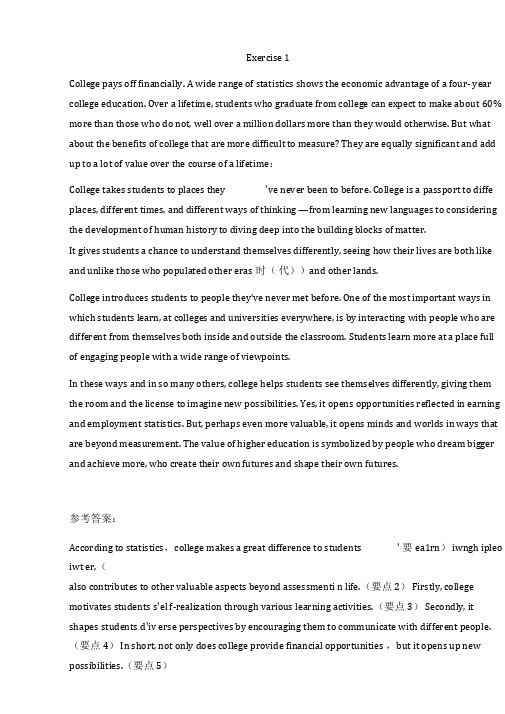
Exercise 1College pays off financially. A wide range of statistics shows the economic advantage of a four- year college education. Over a lifetime, students who graduate from college can expect to make about 60% more than those who do not, well over a million dollars more than they would otherwise. But what about the benefits of college that are more difficult to measure? They are equally significant and add up to a lot of value over the course of a lifetime:College takes students to places they 've never been to before. College is a passport to diffe places, different times, and different ways of thinking —from learning new languages to considering the development of human history to diving deep into the building blocks of matter.It gives students a chance to understand themselves differently, seeing how their lives are both like and unlike those who populated other eras时(代))and other lands.College introduces students to people they've never met before. One of the most important ways in which students learn, at colleges and universities everywhere, is by interacting with people who are different from themselves both inside and outside the classroom. Students learn more at a place full of engaging people with a wide range of viewpoints.In these ways and in so many others, college helps students see themselves differently, giving them the room and the license to imagine new possibilities. Yes, it opens opportunities reflected in earning and employment statistics. But, perhaps even more valuable, it opens minds and worlds in ways that are beyond measurement. The value of higher education is symbolized by people who dream bigger and achieve more, who create their own futures and shape their own futures.参考答案:According to statistics,college makes a great difference to students ' 要ea1rn) iwngh ipleo iwt er,(also contributes to other valuable aspects beyond assessmenti n life.(要点2) Firstly, college motivates students s'el f-realization through various learning activities.(要点3) Secondly, it shapes students d'iv erse perspectives by encouraging them to communicate with different people.(要点4) In short, not only does college provide financial opportunities ,but it opens up new possibilities.(要点5)分析过程:试题详解:1,核心内容——本文是一篇议论文,全文共分四段。
summary范文十篇
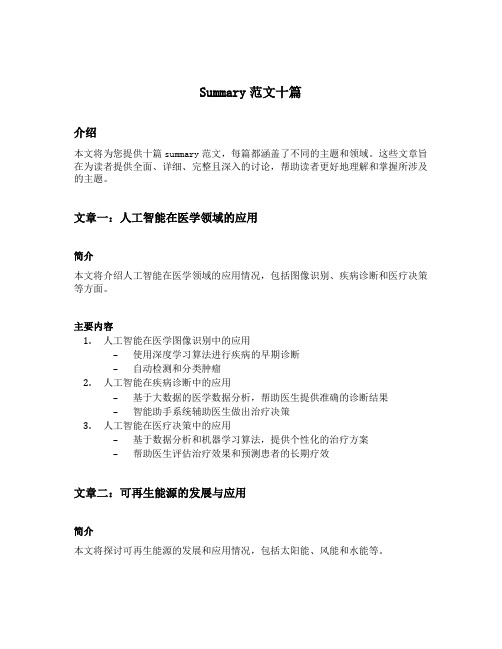
Summary范文十篇介绍本文将为您提供十篇summary范文,每篇都涵盖了不同的主题和领域。
这些文章旨在为读者提供全面、详细、完整且深入的讨论,帮助读者更好地理解和掌握所涉及的主题。
文章一:人工智能在医学领域的应用简介本文将介绍人工智能在医学领域的应用情况,包括图像识别、疾病诊断和医疗决策等方面。
主要内容1.人工智能在医学图像识别中的应用–使用深度学习算法进行疾病的早期诊断–自动检测和分类肿瘤2.人工智能在疾病诊断中的应用–基于大数据的医学数据分析,帮助医生提供准确的诊断结果–智能助手系统辅助医生做出治疗决策3.人工智能在医疗决策中的应用–基于数据分析和机器学习算法,提供个性化的治疗方案–帮助医生评估治疗效果和预测患者的长期疗效文章二:可再生能源的发展与应用简介本文将探讨可再生能源的发展和应用情况,包括太阳能、风能和水能等。
1.太阳能的发展与应用–太阳能电池的工作原理和研发进展–太阳能发电的应用领域和发展趋势2.风能的发展与应用–风力发电的原理和技术–风能发电的优势和挑战3.水能的发展与应用–水力发电的工作原理和类型–水能发电的可持续性和经济性文章三:大数据在商业领域的应用简介本文将介绍大数据在商业领域的应用情况,包括市场调研、客户关系管理和供应链优化等方面。
主要内容1.大数据在市场调研中的应用–利用大数据分析市场趋势和消费者行为–通过数据挖掘发现新的市场机会2.大数据在客户关系管理中的应用–基于用户数据提供个性化的产品和服务–分析客户反馈和行为,改进营销策略3.大数据在供应链优化中的应用–预测需求,减少库存和运输成本–分析供应链数据,优化物流和生产流程文章四:人工智能和物联网的融合简介本文将探讨人工智能和物联网的融合,包括智能家居、智慧城市和智能工厂等方面。
1.人工智能在智能家居中的应用–基于语音识别和图像识别的智能家居控制系统–智能家电设备的自学习和智能调控2.人工智能在智慧城市中的应用–基于传感器和数据分析的城市交通管理–基于大数据的城市安全监控和预警系统3.人工智能在智能工厂中的应用–自动化生产线的智能控制和优化–数据分析和机器学习在工厂管理中的应用文章五:区块链技术的发展和应用简介本文将介绍区块链技术的发展和应用情况,包括数字货币、供应链管理和身份验证等方面。
上海高考英语新题型之概要写作(Summary)

上海高考英语新题型之概要写作澄衷高级中学孙吉从2017年起,上海英语高考试卷的题型将面临许多调整,其中之一便是增加了概要写作(Summary writing),也有许多人将之称为“小作文”。
概要写作分值占据15分,考查的是考生阅读和写作的综合能力。
概要写作所给定的语篇一般在200-250字,内容丰富多样,包含故事、时政、科普等,体裁以记叙文、说明文为主,字数一般要求在50-60字,答案尽量符合“Key points of a summary”的要求。
一.正确认识概要写作1. Definition of summary writing(概要写作的定义)By summary, we mean a brief restatement, in your own words, of the content of a passage, an article, a chapter or a book.2. Key points of a summary(概要写作的要点)Conciseness(简要性):Omit unnecessary details like examples, explanations and other unimportant information.Length: 1/4-1/3 of the original text.Completeness(完整性):To include all the main and supporting points delivered in you own words in a condensed manner.Accuracy(准确性):To give the same attention and stress to the points as the author does.Coherence(连贯性):Rather than an outline listed as key words and phrases, a summary is a paragraph with necessary transitions and function structures to make it flow.Objectivity(客观性):Do not include your own ideas or emotions on the topic. The summary should reflect the content of the original passage only.3. Steps to write a summary(概要写作的步骤)1)Skim the text to find out the general theme.2)Analyze the text’s structure to divide it into several sections, find out the main idea of each section and write it out briefly with your own words. (one sentence) 3)Write down the key supporting points for each main idea without involving minor details.4)Organize the main and related supporting points in a logical order with necessary transitions to achieve coherence.5)Proofread for grammatical, spelling and punctuation mistakes.4. Beginning of a summary(概要写作的开头)Begin your summary with:*The author’s name*The article’s or chapter’s name*The author’s thesis statement—a general overview(survey) of the article.The Body:First of all, the author describes……He then points out that……In addition, the author talks about……Finally, the author suggests……Some other introductory phrases:*(The author) states in (this article) that…*(The author), in (this article) shows that…*In (this article), (the author) writes that…*As (the author) says in (this article),…*The main idea of (the author’s article) is…*The author believes (holds; maintains; claims; argues; points out; suggests; proposes) that + clause…*The author talks about (explains; describes; reveals; discusses; focuses on) + n.二.记叙文概要写作要点点拨记叙文体的阅读材料,相比其他文体而言,写概要相对容易。
雅思阅读summary题型的解题技巧讲解

雅思阅读summary题型的解题技巧讲解summary填空题是雅思阅读题中常见题型,在阅读考试中占较大的比重。
同时也是众多雅思考生最头痛的一种题型。
今天三立在线教育雅思网为大家带来的是雅思阅读summary题型的解题技巧讲解的相关资讯,备考的烤鸭们,赶紧来看看吧!总的来说,雅思阅读summary填空题主要有两种形式:一种是单词填空式,这种形式主要针对文章全文或者部分段落写出的一篇摘要,空出若干空格,要求考生从文章中寻找相应的单词进行填空。
另一种是单词选择式,就是在第一种形式的基础上,额外提供了一个词库,要求考生从词库中选词填空。
下面,将详细讲解如何快速而有效的解答这两种形式的summary填空题。
一、单词填空式解题策略:对于单词填空式题,一般把握三个关键信息:逻辑关系词,语法属性,定位。
首先,观察空格前后是否有语义间有逻辑关系的连接词,即逻辑关系词推断。
这类表示空格前后内容逻辑关系的连接词主要包括:①表示因果关系的词,如because,as,since,for,due to,thanks to,as a result of等。
在考试中,在因果关系中除了一些连接词的衔接外,还有一些表示因果关系的大词,如trigger,breed,induce,engender,generate,be responsible for,affect,determine 等,这些词在语义中隐含了因果关系。
所以也是考生在解题中值得注意的。
②表示转折关系的词,如but,however,while,yet,instead,rather,whereas 等③表示让步关系的词,如despite,in spite of,although等④表示并列关系的词,如and,both…and…,neither…nor等⑤表示举例关系的词,如such as,for example等观察有无这类词的目的在于为了回原文定位时,能缩小寻找范围,使定位更加准确。
- 1、下载文档前请自行甄别文档内容的完整性,平台不提供额外的编辑、内容补充、找答案等附加服务。
- 2、"仅部分预览"的文档,不可在线预览部分如存在完整性等问题,可反馈申请退款(可完整预览的文档不适用该条件!)。
- 3、如文档侵犯您的权益,请联系客服反馈,我们会尽快为您处理(人工客服工作时间:9:00-18:30)。
The Development of WritingFew people would disagree with the belief that primitive man learned to speak long before he developed a system of writing. But while his early spoken language may have been nothing more than a few sounds, early man could transmit messages across distances by means of signals from drums, smoke and fire. It was probably a desire to record messages that led to the development of alphabets. For early man, who could speak and who could send messages, could not put those messages into permanent form. The desire to have permanent records may not be easily understood in today’s world where electronic science has made disk and tape recordings commonplace. If early man wanted to leave records of past events to remind him of good times and bad, he had to depend on his memory, and on primitive markings such as piles of stones, cuttings on sticks, etc. The limitations of this system led early man to turn to rock drawings for the expression of sophisticated ideas. This form of writing depended on pictures to convey ideas, and although more advanced than previous developments, it was still too limited for man to be entirely satisfied. Man finally was able to develop a system of picture writing that associated symbols and sound. This system, which was originated by the early Sumerians and the Egyptians more than 3,000 B.C., is based on the same principle that we sue today in most world alphabets. It was about 1,000 B.C. that the Phoenicians took the complicated picture alphabets of the Egyptians and simplified then into about 30 symbols, each one standing for aconsonant sound. Finally, the ancient Greeks, about 800 B.C., refined this Phoenician alphabet and added signs for vowel sounds. The alphabet used in English, an din many other world languages, is called the Roman alphabet because it was developed by the Romans who had taken most of it from another Italic people, the Etruscan, who, in their turn, had learned it from the ancient Greeks. Letters on ancient monuments in Rome prove that the Roman alphabet, the same alphabet used today, had been perfected by A.D. 114.Secret to Longevity Lies in Genes, Study FindsTue Jun 11, 5:16 PM ETby Maggie Fox, Health and SciencesCorrespondentWASHINGTON (Reuters) Want to live to be 100? Pick old grandp arents. It’s an old irony, but researchers said on Tuesday they had shown this is remarkably true when it comes to surviving into old age, and they believe a cluster of just a few genes may be responsible. They have set up a company that studies centenarians to see if the generic secret to living a long and healthy life may result in drugs that can prevent the diseases of aging, such as Alzheimer’s and heart disease. "It isn’t really that obvious," Dr. Thomas Perls, who led the study, said in a telephone in terview. "It isn’t old age that runs in families. It’s exceptional old age that runs in families. We think this may be a handfulof genes that could be playing really substantial roles in the ability to get to very old age, much of it in good health."Perl’s team at Harvard University and Beth Israel Deaconess Medical School studied 444 families, including more than 2,000 relatives of people who live to 100. Demographer John Wilmoth of the University of California Berkeley compared this data to the 1900 census and the Social Security Administration database. "Female siblings had death rates at all ages at about one-half the national level," they wrote in their report, published in this week issue of the Proceedings of the National Academy of Sciences. "Male siblings of centenarians were at least 17 times as likely to attain age 100 themselves, while female siblings were at least eight times as likely." Perls is not interested in extending life at any cost.WHO WANTS TO GET THAT OLD, ANYWAY?"People might think, who wants to live to 100 anyway? because people get the idea that the older you get, the sicker you get." But his study found just the opposite. "You can get Alzheimer, stroke, cancer in your 60s and 70s and expect to live another 30,40 years." Earlier work has shown many of these people share similarities in their DNA, especially on chromosome 4. Perls hopes his company, Centagenetix (http:/.centagenetix.) can home in on the important genes and perhaps make discoveries that will lead to drugs that can stave off disease."Discovering these genes will lead to understanding the biochemical pathways that those genes affect," he said. "My hope is that that wouldhelp a lot of other people age more slowly and delay and, my goodness even escape, something like Alzheimer."Which genes you do not have may be as important as those you do, Perls said. For instance, he found the 100-year-olds were very unlikely to have a version of a gene called APOE-4, which is associated with high cholesterol and Alzheimer. Environment did not seem to be too important to those who lived to be 100. Census Bureau data showed they were more likely to be poor and poorly educated ?something not usually associated with old age.But for most of us, environment and behavior is key. "I think the average set of genes gets us to our mid- to late-80s," said Perls, a geriatrician who now works at Boston Medical Center. "I base this on twin studies and on Seventh Day Adventists, who have a life expectancy of 87 years, who do everything right。
